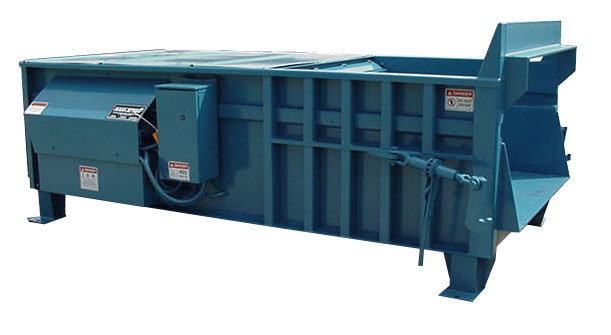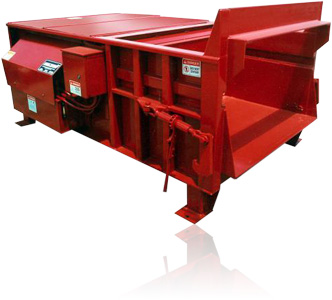The Function of Waste Equipment in Supporting Sustainable Waste Disposal Practices
Waste Equipment serves an essential role in advancing lasting waste disposal techniques. It includes a series of tools developed to improve the efficiency of waste collection, handling, and segregation. By utilizing Equipment such as compactors, shredders, and recycling containers, areas can greatly minimize their dependence on land fills. The influence of these tools extends beyond performance. Recognizing their wider effects discloses insights right into exactly how they form ecological obligation and area interaction. What lies ahead in this progressing landscape?
Recognizing Waste Equipment and Its Relevance
Waste Equipment plays a crucial role in efficient waste administration systems. It incorporates a range of devices and machinery developed to take care of, process, and throw away waste materials effectively. Comprehending waste Equipment is important for services, municipalities, and organizations intending to implement lasting waste disposal practices - Commercial garbage compaction equipment. Properly functioning waste Equipment not only improves the collection and transportation of waste however likewise lessens ecological impact by making certain that waste is handled sensibly
The relevance of waste Equipment extends to boosting recycling initiatives, minimizing garbage dump use, and promoting source recovery. Equipment such as compactors, shredders, and balers assist in the handling of waste, making it less complicated to separate recyclable materials from basic refuse. Furthermore, developments in waste technology add to the development of more eco-friendly services, consequently strengthening the commitment to sustainability. On the whole, waste Equipment functions as a keystone for effective waste monitoring, promoting a cleaner and healthier setting for future generations.
Kinds Of Waste Equipment for Effective Waste Management
Efficient waste administration relies upon various kinds of Equipment designed to resolve specific disposal needs. Amongst these, compactors play an essential duty by minimizing the quantity of waste, making transportation more effective. Shredders are crucial for damaging down large things, facilitating simpler handling and disposal. In addition, balers press recyclable products into workable bales, maximizing storage and transport.
Containers and bins are fundamental for accumulating waste at the resource, guaranteeing correct segregation and minimizing contamination. For harmful products, specific Equipment, such as drum crushers and watertight containers, is essential to ensure security and conformity with laws.
Lastly, transportation automobiles furnished with hydraulic systems boost the efficiency of waste collection and disposal procedures. Each kind of waste Equipment adds to a structured waste monitoring system, promoting sustainability and decreasing ecological impact with effective disposal techniques.
The Function of Reusing Bins in Lasting Practices
Reusing bins play a necessary role in promoting sustainable methods by promoting effective waste separation. By offering assigned containers for recyclable materials, they motivate individuals to adopt environment-friendly habits. This easy implementation greatly adds to reducing garbage dump waste and enhancing recycling prices.
Reliable Waste Separation
Proper waste separation plays an essential function in promoting lasting techniques, and recycling containers act as a considerable device in this procedure. By plainly comparing recyclables, compostables, and general waste, these bins help with efficient sorting, reducing contamination and making best use of recycling performance. Their critical positioning in private and public areas motivates individuals to take part in responsible garbage disposal. In addition, using color-coded containers aids to simplify the separation process, making it intuitive for users. This organizational method not just improves reusing rates however also elevates recognition concerning the significance of waste administration. Basically, reusing containers are basic parts that support efficient waste splitting up, ultimately adding to a more lasting atmosphere and reducing the total stress on land fills.
Urging Eco-Friendly Actions
Individuals might be inclined to overlook their influence on the environment, the visibility of reusing bins substantially affects eco-friendly actions. These containers offer as visual suggestions, encouraging people to different recyclables from basic waste. Their critical positioning in public areas advertises ease of access, making it much easier for people to adopt sustainable techniques. Research studies show that when recycling containers are available, reusing rates raise significantly, showing a direct relationship in between facilities and habits. Furthermore, vibrant signs on these bins informs individuals about what materials can be reused, minimizing contamination prices. By fostering a society of recycling, these bins not just promote proper waste administration yet likewise motivate a collective obligation towards ecological stewardship, eventually contributing to a much more lasting future.
Composting Systems: Turning Waste Into Resources
Composting systems serve as a crucial device in transforming organic waste right into useful sources, supplying numerous ecological benefits. Different types of composting Equipment satisfy different demands, making the process available to both communities and people. Understanding the composting procedure is essential for maximizing its effectiveness and advertising sustainable waste monitoring practices.
Advantages of Composting Solutions
Many areas are significantly identifying the countless benefits of composting systems, which transform natural waste into useful sources. These systems properly lower landfill waste, thus reducing greenhouse gas exhausts and conserving all-natural sources. By transforming food scraps, backyard waste, and other organic materials right into nutrient-rich compost, they improve dirt wellness and fertility, promoting sustainable farming practices. Furthermore, composting aids to keep moisture in the dirt, reducing the demand for chemical plant foods and watering. It fosters biodiversity by supplying a habitat for helpful microbes and bugs. In addition, composting informs individuals concerning ecological stewardship, encouraging a culture of sustainability. On the whole, composting systems play a necessary role in producing a circular economy, where waste is decreased, and resources are reused.
Sorts Of Composting Equipment
A range of composting Equipment is offered to help with the efficient processing of natural waste right into beneficial compost. These systems range from simple backyard garden compost containers to advanced business composters. For home use, stemless glass and static containers are popular, permitting convenient aeration and blending. Oxygenated fixed heaps make use of blowers to improve air movement, greatly accelerating disintegration. Massive operations may employ in-vessel composters, which manage temperature and moisture for perfect composting problems. Worm composters, or vermicomposting systems, harness the all-natural digestion procedures of worms to damage down raw material. In addition, chippers and shredders help prepare products by lowering dimension, promoting faster malfunction. Each kind of Equipment serves particular demands, see making it possible for varied composting methods that add to sustainable waste administration.
Composting Process Explained
The composting process changes natural waste right into nutrient-rich sources with a collection of chemical and organic reactions. Microorganisms such as fungis and microorganisms damage down organic products, consisting of food scraps and lawn waste. This disintegration produces heat, promoting more microbial task and increasing the malfunction procedure. As the garden compost grows, the temperature lowers, allowing useful microorganisms to thrive. The presence of oxygen is necessary, promoting cardio conditions that enhance microbial effectiveness. Throughout this process, carbon-to-nitrogen proportions need to be kept to enhance disintegration. Completion outcome is humus, a dark, crumbly substance rich in nutrients, which can be made use of to enhance soil, assistance plant development, and add to sustainable agricultural techniques.
Ingenious Technologies in Waste Collection and Disposal
As cities face enhancing waste quantities and environmental worries, ingenious innovations in waste collection and disposal become vital solutions. Smart waste bins outfitted with sensors track fill degrees, maximizing collection paths and minimizing gas intake. These containers can additionally connect with waste monitoring systems, assisting in prompt pick-ups and decreasing overflow problems. On top of that, autonomous lorries, including drones and robotic systems, are being released to enhance operational performance in waste collection.
Improvements in arranging modern technologies, such as expert system and artificial intelligence, enable more efficient reusing procedures by quickly identifying and separating materials. Waste-to-energy modern technologies convert organic waste into renewable power, minimizing garbage dump dependence and contributing to power sustainability. These developments not only streamline waste administration methods however also promote a circular economic situation, thus cultivating a sustainable strategy to garbage disposal. Ultimately, the assimilation of these innovations plays a critical function in resolving urban waste obstacles and boosting environmental stewardship.
Area Engagement Via Waste Equipment
While efficient waste administration depends greatly on sophisticated technologies, community involvement with waste Equipment plays an essential role in cultivating lasting techniques (Commercial garbage compaction equipment). Waste Equipment, such as reusing bins and composting terminals, offers not just as practical tools yet additionally as catalysts for neighborhood recognition and engagement. By positioning these resources in available locations, towns encourage people to take an energetic role in waste decrease and reusing efforts
Educational projects going along with waste Equipment setups can further enhance neighborhood involvement, directing locals on proper disposal methods and the benefits of lasting methods. Furthermore, neighborhood occasions that make use of waste Equipment, such as clean-up drives and reusing obstacles, inspire cumulative action and build a sense of responsibility amongst community members.

The Future of Waste Management and Lasting Solutions
Innovations in innovation and changes in societal attitudes are shaping the future of waste management and sustainable solutions. Smart waste monitoring systems, utilizing IoT devices, are allowing real-time tracking of waste degrees, optimizing collection routes, and decreasing carbon footprints. These developments not only boost effectiveness however likewise advertise reusing and composting campaigns by offering data-driven insights.
Moreover, the rise of circular economic climate practices encourages firms to rethink my blog item design, concentrating on reusability and recyclability. This change promotes a culture of sustainability, where consumers are increasingly requiring environment-friendly products.
Additionally, community involvement in waste administration is coming to be increasingly essential, with educational programs empowering individuals to take responsibility for their waste. As governments worldwide implement more stringent guidelines on waste disposal, businesses and areas are triggered to embrace sustainable methods. With each other, these components lead the way for a future where waste is decreased, and resources are saved, making sure a healthier planet.
Regularly Asked Inquiries

How Can Organizations Profit Monetarily From Purchasing Waste Equipment?
Buying waste Equipment can bring about considerable monetary advantages for services. By boosting performance, decreasing disposal expenses, and improving reusing capacities, firms can reduce functional costs and potentially produce profits with recovered materials.
What Rules Regulate making use of Waste Equipment in Different Areas?
Various policies control waste Equipment usage, differing by region. These consist of environmental criteria, security methods, and functional standards, aimed at like this making certain compliance, promoting public health, and decreasing environmental impact associated with waste monitoring techniques.
How Do I Select the Right Waste Equipment for My Needs?
Choosing the proper waste Equipment demands reviewing details waste types, quantity, and disposal methods. Researching available choices, seeking advice from experts, and considering regulative conformity will certainly help in making an educated decision customized to specific demands.
What Are the Ecological Influences of Ineffective Waste Equipment?
Ineffective waste Equipment can cause raised discharges, higher energy intake, and higher landfill overflow. It usually leads to inappropriate waste segregation, intensifying air pollution and negatively impacting ecological communities, which ultimately prevents sustainable waste monitoring initiatives.
How Can Waste Equipment Be Kept for Optimal Efficiency?
Waste Equipment can be preserved for peak efficiency through routine inspections, timely repairs, correct cleaning, and adherence to manufacturer guidelines. This assures efficiency, extends Equipment life-span, and decreases environmental influence throughout waste management processes.
Waste Equipment plays a vital duty in reliable waste management systems. Understanding waste Equipment is important for municipalities, organizations, and businesses intending to carry out lasting waste disposal methods. While effective waste monitoring counts greatly on sophisticated modern technologies, area involvement with waste Equipment plays a necessary role in cultivating sustainable techniques. Area participation in waste administration is becoming increasingly vital, with instructional programs empowering individuals to take responsibility for their waste. Choosing the appropriate waste Equipment demands examining particular waste types, volume, and disposal techniques.